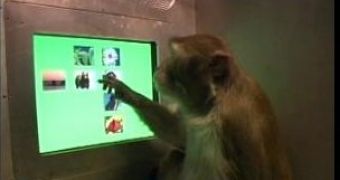Monkeys do not have an articulated language, thus they do not speak. But they do possess an unarticulated simple language, are able to learn human sign languages and to make the difference between two different human languages.
New investigations at Columbia's Primate Cognition Laboratory have revealed, for the first time, that rhesus macaques display meta-cognitive abilities: they can reflect about their memories and assess their performance. The study was a collaborative effort between Herbert Terrace, Columbia professor of psychology & psychiatry, and director of its Primate Cognition Laboratory, and two graduate students, Lisa Son, now professor of psychology at Barnard College, and UCLA postdoctoral researcher Nate Kornell.
The research was made to assess if a monkey has confidence in its answers, and used multiple-choice tests, checking its memory by employing an imaginary money amount that the animal could bet. This concept was based on the fact that children often make pretend bets to show they know the answer to a question.
"The ability to reflect on one's knowledge has always been thought of as exclusively human. We designed a task to determine if a non-human primate could similarly learn to express its confidence about its knowledge by making large or small wagers." said Son.
The researchers trained two macaques to play a touch-screen video game checking their memory capacity while they could place a large or a small bet. Six new photos were displayed at the beginning of each experiment, one at a time. One of them was randomly chosen and displayed after that simultaneously with 8 new photos. The monkeys had to choose this photo and could assess the accuracy of their choice by selecting a high and a low-risk icon from the screen. The high-risk icons brought a large reward for a correct response (3 tokens into a bank displayed on the video monitor) but an incorrect solution meant the loss of the same token amount. Low risk bets meant a juggle of just 1 token. When enough tokens accumulated, the monkey gained food.
The patterns showed that high-risk bets were strongly linked to correct responses and low-risk bets to incorrect replies.
"The pattern of the monkeys' bets provided clear evidence of their ability to engage in meta-cognition, an ability that is all the more remarkable because monkeys lack language. Our results are of general interest because non-verbal tests of the type used in this and other experiments on animal cognition can be adapted to study cognitive abilities of infants and autistic children." said Terrace.

 14 DAY TRIAL //
14 DAY TRIAL //